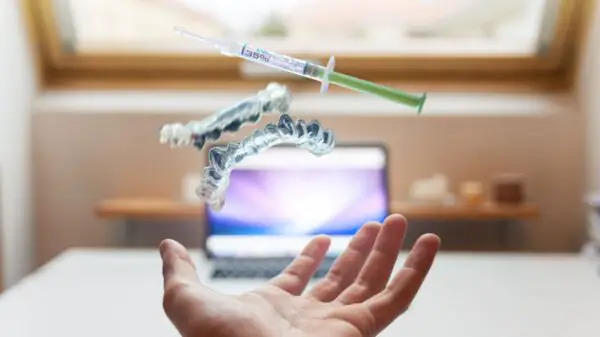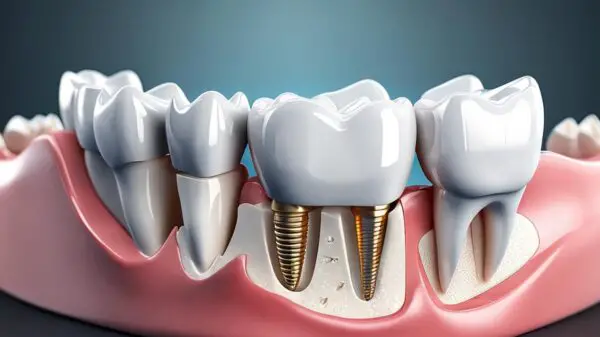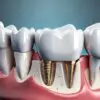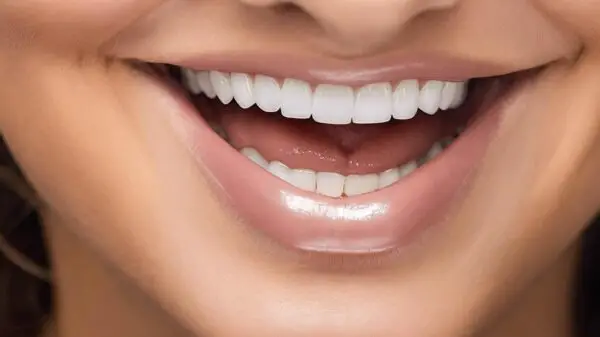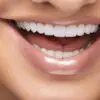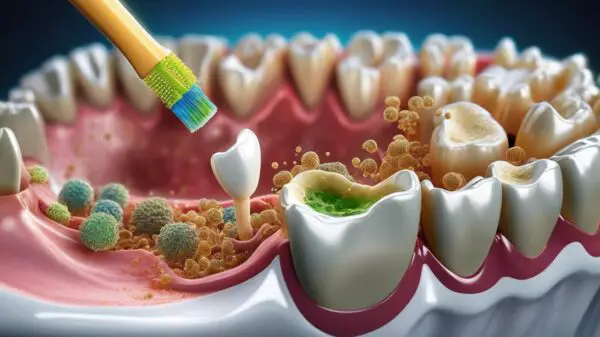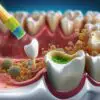Top 8 Common Dental Care Myths
Taking good care of your oral health is essential for your overall well-being. However, many dental care myths still persist, causing people to overlook the importance of good dental hygiene practices. So, what are some common myths about dental care?
Here are 8 common myths about dental care:
- You Only Need to Visit the Dentist When You Have a Problem
- Brushing Harder Is Better for Your Teeth
- You Don’t Need to Floss Every Day
- Sugar Is the Only Cause of Cavities
- You Don’t Need to Visit the Dentist If Your Teeth Look Fine
- Whitening Toothpaste Can Whiten Your Teeth
- Chewing Gum Can Replace Brushing
- Baby Teeth Don’t Need to Be Brushed
In this article, we will debunk eight common dental care myths and explain why it is important to stay informed about dental health.

How Do Dental Care Myths Come About?
Dental care myths often arise from misinformation or outdated information. For instance, people may hear a recommendation from a friend or read an article that presents outdated dental care advice. Furthermore, some myths arise from marketing strategies used by companies to promote their products, such as toothpaste, mouthwash, and dental floss. It is crucial to consult with a dental professional before trying new products or treatments and to stay informed about current dental care practices.
The 8 Common Myths About Dental Care
Here are the eight most common dental care myths:
Myth 1: You Only Need to Visit the Dentist When You Have a Problem
Some people may believe that they only need to visit the dentist when they have a dental problem. However, regular dental check-ups are crucial for maintaining good oral health. During a regular dental visit, your dentist can detect and treat problems early on, before they become more serious. Moreover, dentists can prevent gum disease, which is a leading cause of tooth loss in adults, by monitoring your oral health and providing guidance on how to maintain healthy gums. The American Dental Association recommends scheduling dental visits at least twice a year. Doing so will help ensure your teeth remain healthy and that any potential issues are caught early enough to be quickly treated and resolved.
Myth 2: Brushing Harder Is Better for Your Teeth
It is a common misconception that brushing harder will make your teeth cleaner and whiter. However, brushing too hard can cause damage to your teeth and gums. Brushing too hard can also cause your gums to recede, exposing the roots of your teeth, and leading to sensitivity and other dental problems. Moreover, brushing too hard can wear away the enamel on your teeth, making them more susceptible to decay. This can lead to long-term issues and pain if you are not careful. Instead, try using light motions to gently remove the plaque from your teeth when you brush. It is essential to brush your teeth gently in circular motions to remove plaque and prevent damage to your teeth and gums.
Myth 3: You Don’t Need to Floss Every Day
Flossing is a crucial part of maintaining good oral hygiene. It helps remove plaque and food particles from between your teeth, where your toothbrush can’t reach. Some people believe that flossing every day is unnecessary, but this is a myth. Flossing every day helps prevent gum disease, which is a leading cause of tooth loss in adults. Even though it may be an extra step to add to your routine, flossing is an important part of taking care of your teeth and combating different oral issues and diseases. The American Dental Association recommends flossing at least once a day to keep your teeth and gums healthy.
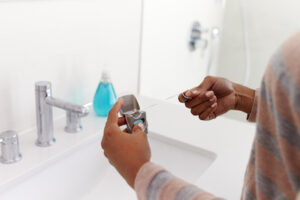
Myth 4: Sugar Is the Only Cause of Cavities
While sugar is a leading cause of cavities, it is not the only cause. Cavities can also be caused by a lack of fluoride in the water, poor oral hygiene, and acidic foods and drinks. A lack of fluoride in the water can cause the enamel to weaken, making it easier for bacteria to penetrate and cause cavities. Moreover, acidic foods and drinks can erode the enamel, leading to tooth decay. This is why it is important to monitor your diet to ensure you are not eating too many acidic or harmful foods that could be damaging your teeth. It is also important to brush regularly to remove the remnants of these foods and meet with your dentist regularly to make sure your teeth are still in good condition.
Myth 5: You Don’t Need to Visit the Dentist If Your Teeth Look Fine
Even if your teeth look fine, you still need to visit the dentist regularly. Many people who do not like going to the dentist often make the excuse that their teeth look fine and they do not need a check-up, however, they are wrong. You can’t skip the dentist based on this common dental care myth! Dentists can detect problems that are not visible to the naked eye, such as cavities between teeth, gum disease, and oral cancer. Regular dental check-ups are crucial to maintaining good oral health and detecting problems early on. Early detection of dental problems can help prevent further damage and save you money in the long run. This can also prevent pain from developing and keep your smile beautiful as well.
Myth 6: Whitening Toothpaste Can Whiten Your Teeth
The active ingredients in whitening toothpaste are typically mild abrasives that help remove surface stains, but they cannot change the natural color of your teeth. If you want to whiten your teeth, it is best to consult with a dental professional who can recommend safe and effective treatments. This helps guarantee your teeth are being whitened in a safe and helpful manner that will give you long-term effects and reach your goal of having a whiter smile.
Myth 7: Chewing Gum Can Replace Brushing
Chewing gum can help freshen your breath and promote saliva production, which can help wash away food particles and bacteria in your mouth. However, chewing gum cannot replace brushing and flossing. Gum cannot remove plaque and tartar from your teeth, which can lead to gum disease and other dental problems. It is essential to brush and floss regularly and visit your dentist for check-ups to maintain good oral health.
Myth 8: Baby Teeth Don’t Need to Be Brushed
Some parents may believe that baby teeth do not need to be brushed, but this is a myth. Baby teeth are just as susceptible to decay and other dental problems as permanent teeth. It is essential to start brushing your child’s teeth as soon as they appear to prevent dental problems in the future. Parents can use a small, soft-bristled toothbrush and a small amount of fluoride toothpaste to brush their child’s teeth twice a day.
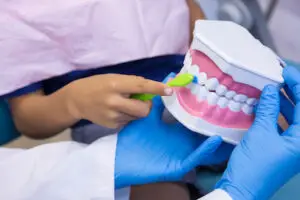
Why Being Educated About Good Oral Health is Important
It is crucial to stay informed about good oral health practices to maintain healthy teeth and gums. Dental care myths can cause people to overlook the importance of maintaining good oral hygiene, which can lead to dental health problems such as cavities, gum disease, and oral cancer. And when you brush these problems off, they can worsen, causing you more money, pain, and time in the long run. By staying informed about good oral health practices and visiting the dentist regularly, you can prevent dental problems and maintain a healthy smile.
Why You Should Not Trust Common Dental Care Myths
In conclusion, there are many dental care myths that persist, causing people to overlook the importance of good oral hygiene practices. This can lead to people not visiting the dentist as much as they should or thinking an oral issue they are having is not as severe as it actually is. This is why it is important to maintain a regular routine of cleaning your teeth and making appointments with your dentist, reporting any potential issues you may be having, and updating them on your oral health. By staying educated and learning why you should not follow dental care myths, you can keep yourself and your smile healthy!
It is crucial to stay informed about current dental care practices and consult with a dental professional before trying new products or treatments. Regular dental check-ups are crucial for maintaining good oral health and can also help you catch potential dental issues before they worsen. Also be sure to brush daily, use floss, practice using lighter motions while brushing, and do not use chewing gum as a substitute for brushing. By following these simple tips and ignoring the ignorant dental myths many of us have heard, you can help keep yourself and your smile happy and healthy! We hope this article has helped you feel more informed about how to take better care of your teeth and always make sure to reach out to your dentist if you have any questions or concerns about your oral health.









